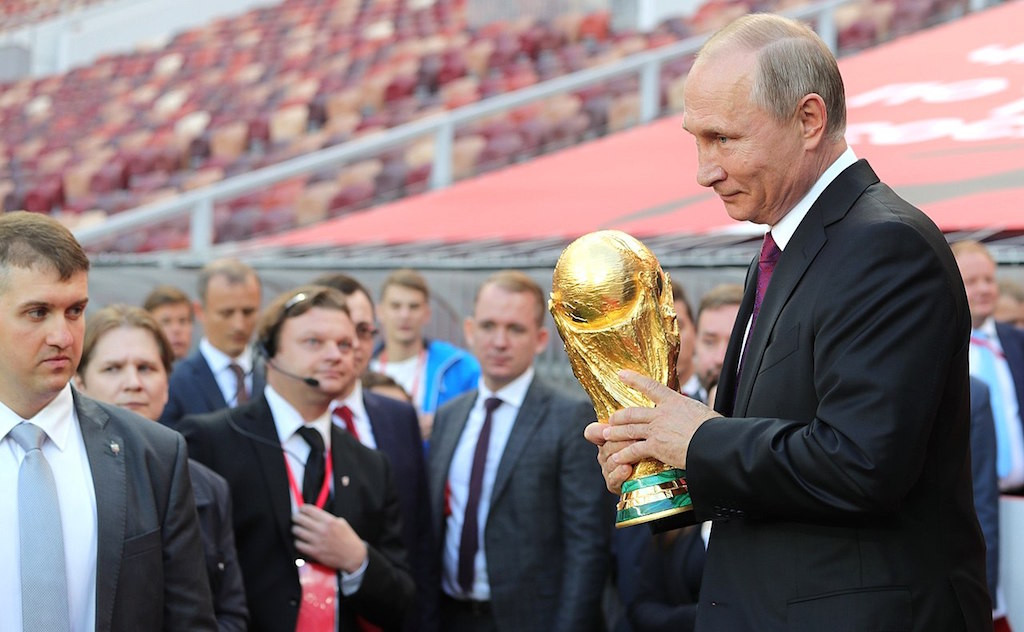Football fans are going to get an education in Chinese TVs, mobile phones, electric scooters and Mongolian dairy products.
As western companies, including Sony, Johnson & Johnson and BP’s Castrol, have pulled out of sponsoring the World Cup after the Fifa bribery and corruption scandal , Chinese firms have secured an unprecedented presence at Russia 2018.
When Russia kicks off against Saudi Arabia in Luzhniki stadium in Moscow on 14 June, fans will be treated to a seven-minute advert for Mengniu Group’s inner Mongolian milk and drinkable yoghurt.
The commercial will be aired during each of the 64 games in the tournament. Spectators fancying an ice-cream will have to pick some from unfamiliar names such as Mood for Green, Ice+ or Suibian SuiXinGuo, after Mengniu secured exclusive rights to sell sweet treats including yoghurt drinks in the stadiums.
Other unfamiliar names to get to grips with during the month-long tournament include: Vivo, a mobile phone firm producing China’s version of the iPhone at a fraction of the price; the TV and fridge maker Hisense; the electric scooter company Yadea; and Dalian Wanda, a conglomerate controlled by the multibillionaire Wang Jianlin.
The dominating presence of Chinese brands comes despite the the country’s national team failing to qualify for the tournament or the previous one in Brazil.
Toxic brand
Simon Chadwick, professor of sports enterprise at the Salford University, said: “As Fifa is now seen as a toxic brand that many western companies do not want to be associated with, China is seizing the opportunity.
“The Chinese view of ethics and governance is different to western standards, and it is very easy for Chinese companies to say ‘Fifa has moved on’. And, that they were not backing the Sepp Blatter-era regime and are supporting a clean Fifa under Gianni Infantino [who replaced Blatter in 2016].”
Chadwick said the lack of demand from western companies to sponsor the World Cup in Russia, and Qatar in 2022, has left Fifa “desperate for cash, and Chinese companies spotted the opportunity for a relatively cost-effective way to get their brands in front of billions of global eyeballs”.
Wang, the fifth-richest person in China with a $23.4bn (£17.6bn) fortune according to Bloomberg’s billionaires index, said: “Two or three years ago, Chinese and Asian companies probably wouldn’t even have had a chance to sponsor Fifa even if we wanted to. But because some western companies dropped out, we got the opportunity.”
Wanda, which owns the British luxury yacht builder Sunseeker, the Hollywood studio that made Godzilla and The Hangover as well as a stake in Atlético Madrid, has signed up a as Fifa partner – the highest level of sponsorship – alongside Coca-Cola, Visa, Adidas and Russia’s Gazprom for the next four World Cups.
“If more Chinese brother companies become Fifa sponsors like Wanda, we will join forces to advance the interests of China soccer,” Wang said.
Chadwick said the Chinese companies’ Fifa sponsorship deals were encouraged by President Xi Jinping to help fuel his dream of turning China into a “world football superpower” by 2050.
“China wants to host the the World Cup, China wants to win the World Cup, and I speculate they also want a Chinese president of Fifa,” Chadwick said. “Rescuing Fifa financially with these sponsorship deals will help the chances of achieving those dream immeasurably.”
Income stream
After TV rights sales, sponsorship is Fifa’s biggest income stream and made up $1.6bn out of total income for the 2014 World Cup in Brazil. The loss of sponsors and struggle to sign deals after the bribery scandal dragged Fifa to a record $369m loss in 2016.
John Tibbs, founder and chair of JTA, a sports reputation management company, said it was sensible of Chinese firms to use football for promotion. “As the traditional western brands get cold feet and face consumers’ pressure, it is inevitable that Fifa turns to new markets,” he said.
“For Chinese brands seeking new markets it is relatively very easy and prestigious to partner with Fifa. It is widely believed that China will bid for the 2030 World Cup, obviously if there are a large number of Chinese sponsors helping to prop up Fifa that is a very good starting point.”
Sam Burne James, news editor of PR Week, said Fifa was “certainly seen as toxic” by many British brands, and Boris Johnson’s comparison of the World Cup under Vladimir Putin to the 1936 Olympic Games under Hitler had not helped.
“If you look at few tournaments back, most of the brands would be recognisable to western audiences now several of them are unheard of – and that shift will continue,” he said.
“Chinese companies get two things from sponsoring the World Cup. The first is access to western audiences that they will sooner or later be trying to win over, as their companies expand. The other is a cosmopolitan veneer to their brands, which they hope will resonate with their sizeable domestic markets.”
Vivo, founded nine years ago, paid €400m (£350m) for a six-year deal that included Russia 2018, Qatar 2022 and the Confederations Cup.
It has signed up the Brazilian footballer José Roberto Gama de Oliveira--better known as Bebeto--and Holland’s Ruud Gullit to front its World Cup campaign--and its advertising campaign video , launched this week, sums up the opportunity the Chinese corporate sponsors are trying to grab: “The world is watching,” Vivo said. “This is our moment.”
By Rupert Neate
